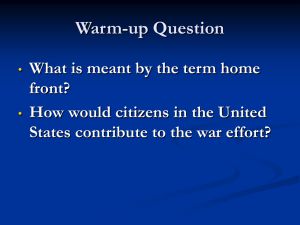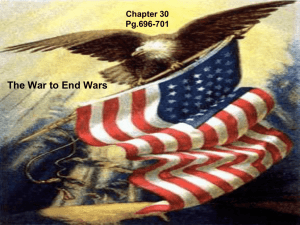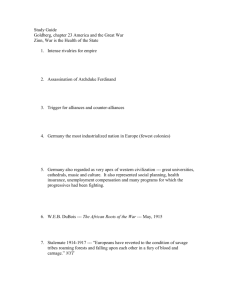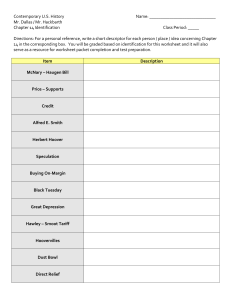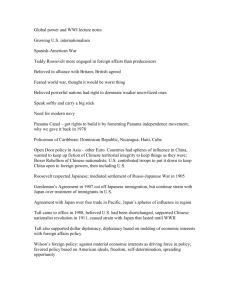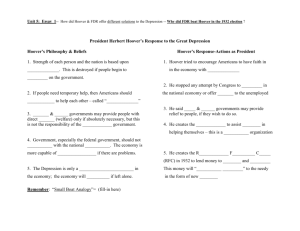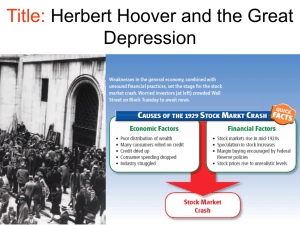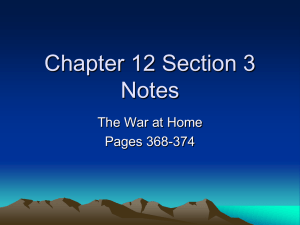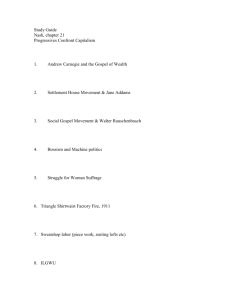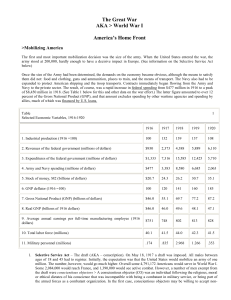WWI Acts & Boards
advertisement
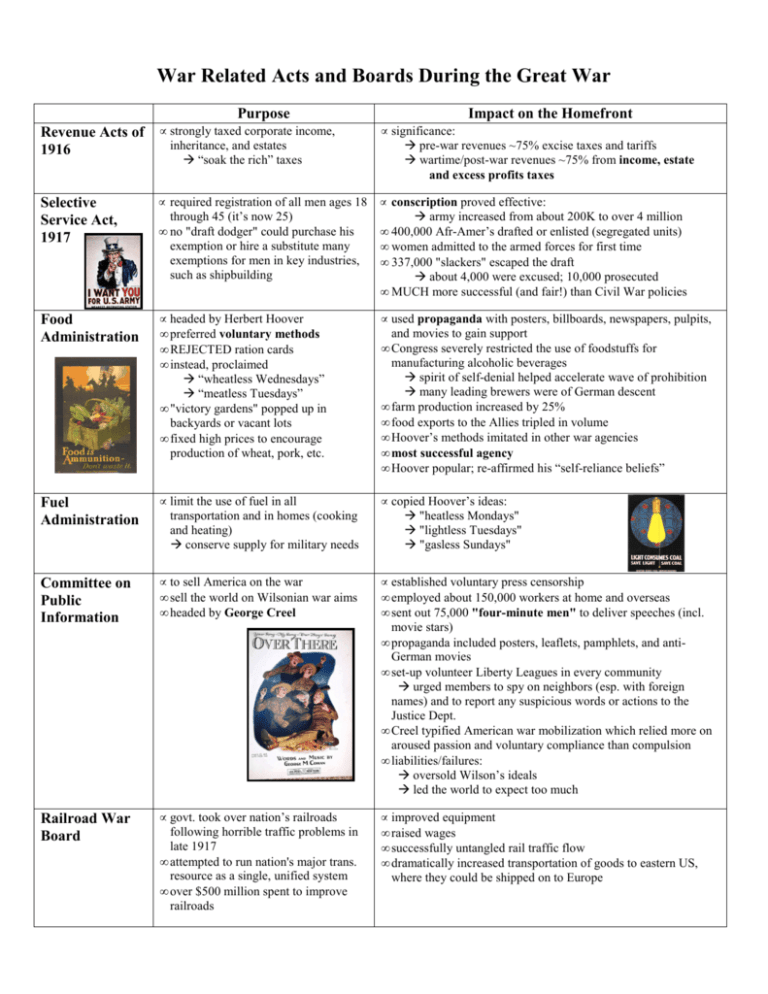
War Related Acts and Boards During the Great War Purpose Impact on the Homefront Revenue Acts of 1916 • strongly taxed corporate income, inheritance, and estates “soak the rich” taxes • significance: pre-war revenues ~75% excise taxes and tariffs wartime/post-war revenues ~75% from income, estate and excess profits taxes Selective Service Act, 1917 • required registration of all men ages 18 through 45 (it’s now 25) • no "draft dodger" could purchase his exemption or hire a substitute many exemptions for men in key industries, such as shipbuilding • conscription proved effective: army increased from about 200K to over 4 million • 400,000 Afr-Amer’s drafted or enlisted (segregated units) • women admitted to the armed forces for first time • 337,000 "slackers" escaped the draft about 4,000 were excused; 10,000 prosecuted • MUCH more successful (and fair!) than Civil War policies Food Administration • • • • headed by Herbert Hoover preferred voluntary methods REJECTED ration cards instead, proclaimed “wheatless Wednesdays” “meatless Tuesdays” • "victory gardens" popped up in backyards or vacant lots • fixed high prices to encourage production of wheat, pork, etc. • used propaganda with posters, billboards, newspapers, pulpits, and movies to gain support • Congress severely restricted the use of foodstuffs for manufacturing alcoholic beverages spirit of self-denial helped accelerate wave of prohibition many leading brewers were of German descent • farm production increased by 25% • food exports to the Allies tripled in volume • Hoover’s methods imitated in other war agencies • most successful agency • Hoover popular; re-affirmed his “self-reliance beliefs” Fuel Administration • limit the use of fuel in all transportation and in homes (cooking and heating) conserve supply for military needs • copied Hoover’s ideas: "heatless Mondays" "lightless Tuesdays" "gasless Sundays" Committee on Public Information • to sell America on the war • sell the world on Wilsonian war aims • headed by George Creel • established voluntary press censorship • employed about 150,000 workers at home and overseas • sent out 75,000 "four-minute men" to deliver speeches (incl. movie stars) • propaganda included posters, leaflets, pamphlets, and antiGerman movies • set-up volunteer Liberty Leagues in every community urged members to spy on neighbors (esp. with foreign names) and to report any suspicious words or actions to the Justice Dept. • Creel typified American war mobilization which relied more on aroused passion and voluntary compliance than compulsion • liabilities/failures: oversold Wilson’s ideals led the world to expect too much Railroad War Board • govt. took over nation’s railroads following horrible traffic problems in late 1917 • attempted to run nation's major trans. resource as a single, unified system • over $500 million spent to improve railroads • • • • improved equipment raised wages successfully untangled rail traffic flow dramatically increased transportation of goods to eastern US, where they could be shipped on to Europe Purpose Impact on the Homefront National War Labor Board • created to oversee labor disputes keep production of war materials constant • essentially prohibited strikes but encouraged progressive reforms (higher-wages, 8-hr day, and unionization) • Gompers a board member; gave loyal support to the war effort (he promised to prevent strikes during the war) • significance: recognized workers’ right to unionize; seen as revolutionary • union membership up: 2.5 million (1916) to 4 million in (1919) • given control over: raw materials distribution (e.g., iron ore, coal, etc.) production (what should be produced by private industry) prices labor relations • WIB never really had much power • disbanded within days after the armistice • most heavy equipment and munitions used by US made by Britain or France (!!!) • increased business’ desire for laissez faire and weak central gov’t • set precedent for future government-industry cooperation for 1920s and New Deal agencies of 1930s War Industries Board • headed by Bernard Baruch • formed late in war • a response to lack of centralized control of war mobilizations due to political opposition military refused to cooperate with civilian agency in purchasing supplies domestic war effort almost collapsed in Dec. 1917 Wilson used emergency war powers to create WIB Espionage Act of 1917 • provided fines/imprisonment for persons making false statements aiding the enemy, inciting rebellion in the military, or obstructing draft recruitment • resulted in 1,900 prosecutions • anti-war Socialists and members of radical union IWW especially targeted • Eugene V. Debs convicted & sentenced to 10 years in prison • Schenck v. U.S. (1919) upheld the constitutionality of the Espionage Act (“clear and present danger”) Sedition Act of 1918 • forbade any criticism of the gov’t, flag, or uniform (even if insignificant) • expanded mail exclusion by US Postal Service • • • • reflected fears about Germans and anti-war Americans especially targeted anti-war Socialists & members of IWW after war, lots of pardons issued for false arrests/imprisonment Wilson vetoed a bill to abolish the Esp. & Sed. Acts Palmer Raids/Red Scare • Wilson one of most nativist presidents in U.S. history. • both prized national unity at the expense of civil liberties

